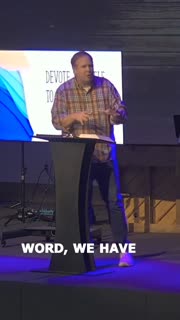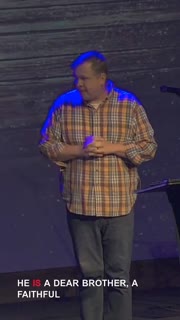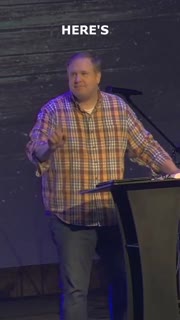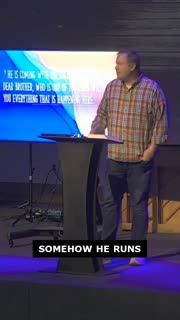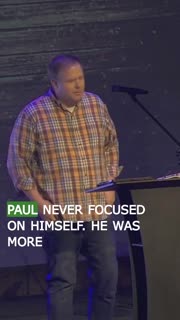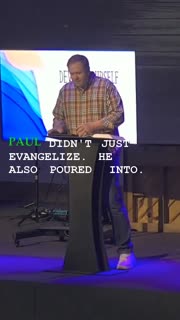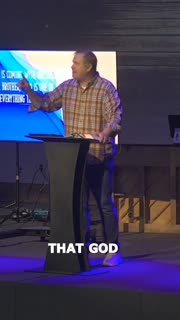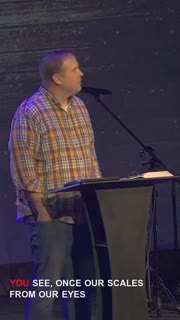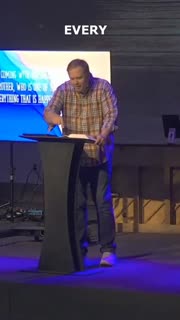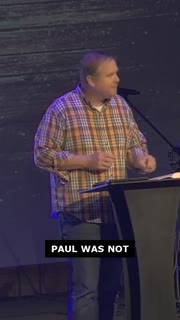Discipleship: Transforming Lives Through Mentorship and Faith
Summary
### Summary
Good morning, everyone. It's a joy to gather around God's Word and celebrate what He has done and is doing in our lives. Today, we delve into the closing part of Paul's letter to the Colossian church, focusing on two key figures: Tychicus and Onesimus. Tychicus is described as a dear brother, a faithful minister, and a fellow servant in the Lord. His name itself means "dear brother and faithful servant," and he lives up to this identity. Tychicus didn't become this way overnight; he was mentored and discipled by Paul, who poured into him, equipping him for ministry.
Onesimus, on the other hand, was a slave who had wronged his master, Philemon, and fled to Rome. There, he encountered Paul and was transformed by the Gospel. Paul sends Onesimus back to Philemon, not as a slave but as a dear brother in Christ. This transformation is a powerful testament to the redemptive power of Jesus Christ.
Paul's life exemplifies the importance of discipleship. He didn't just evangelize; he mentored, trained, and equipped others. This is a call for us to reflect on who the "Pauls" and "Onesimuses" are in our lives. Who has poured into us, and who are we pouring into? The Holy Spirit prepares the way, but we are the vessels God uses to disciple and mentor others.
Paul's transformation from Saul, a persecutor of Christians, to Paul, a servant of Christ, is a powerful reminder that God uses broken vessels for His glory. Despite his past, Paul didn't focus on himself but on discipling others. This is a call for us to get outside our comfort zones and invest in others, just as Paul did.
### Key Takeaways
1. The Power of Discipleship: Tychicus didn't become a faithful minister overnight. He was mentored and discipled by Paul, who poured into him, equipping him for ministry. This highlights the importance of having mentors in our spiritual journey and being willing to mentor others. [37:13]
2. Transformation Through Christ: Onesimus was a runaway slave who encountered Paul and was transformed by the Gospel. He returned to Philemon not as a slave but as a dear brother in Christ. This story underscores the redemptive power of Jesus and the importance of seeing people through the lens of their potential in Christ. [42:03]
3. Paul's Example of Mentorship: Paul didn't just evangelize; he mentored, trained, and equipped others. He poured into Tychicus and Onesimus, showing us the importance of investing in others' spiritual growth. This is a call for us to reflect on who we are mentoring and who has mentored us. [54:49]
4. God Uses Broken Vessels: Paul's transformation from Saul, a persecutor of Christians, to Paul, a servant of Christ, is a powerful reminder that God uses broken vessels for His glory. Despite his past, Paul focused on discipling others, showing us that our past doesn't disqualify us from being used by God. [52:53]
5. Investing in Others: We are called to invest in others, just as Paul did. This means getting outside our comfort zones and being willing to pour into others, even when it's challenging. The Holy Spirit prepares the way, but we are the vessels God uses to disciple and mentor others. [56:27]
### YouTube Chapters
[0:00] - Welcome
[33:58] - Opening Prayer
[35:43] - Importance of Reading God's Word
[37:13] - Introduction to Tychicus
[38:36] - Characteristics of Tychicus
[40:12] - Tychicus' Role in the Colossian Church
[42:03] - Introduction to Onesimus
[43:58] - Paul's Letter to Philemon
[45:31] - The Importance of Not Skipping Scripture
[46:51] - Personal Stories of Mentorship
[48:20] - Mission Trip Reflections
[49:44] - Equipping and Training Others
[51:25] - Paul's Transformation
[52:53] - God Uses Broken Vessels
[54:49] - The Call to Disciple Others
[56:27] - Investing in Others
[01:04:01] - Pouring into the Next Generation
[01:05:34] - Final Challenge and Prayer
Study Guide
### Bible Reading
1. Colossians 4:7-9 (NIV)
> "Tychicus will tell you all the news about me. He is a dear brother, a faithful minister and fellow servant in the Lord. I am sending him to you for the express purpose that you may know about our circumstances and that he may encourage your hearts. He is coming with Onesimus, our faithful and dear brother, who is one of you. They will tell you everything that is happening here."
2. Philemon 1:10-12 (NIV)
> "I appeal to you for my son Onesimus, who became my son while I was in chains. Formerly he was useless to you, but now he has become useful both to you and to me. I am sending him—who is my very heart—back to you."
3. Acts 9:3-6 (NIV)
> "As he neared Damascus on his journey, suddenly a light from heaven flashed around him. He fell to the ground and heard a voice say to him, 'Saul, Saul, why do you persecute me?' 'Who are you, Lord?' Saul asked. 'I am Jesus, whom you are persecuting,' he replied. 'Now get up and go into the city, and you will be told what you must do.'"
### Observation Questions
1. How does Paul describe Tychicus in Colossians 4:7-8? What roles does he fulfill? ([37:13])
2. What transformation did Onesimus undergo according to Philemon 1:10-12? ([42:03])
3. What was Saul's (Paul's) experience on the road to Damascus as described in Acts 9:3-6? ([51:25])
4. How did Paul’s mentorship impact Tychicus and Onesimus according to the sermon? ([54:49])
### Interpretation Questions
1. What does Paul's description of Tychicus as a "dear brother, a faithful minister, and fellow servant in the Lord" suggest about the qualities valued in Christian ministry? ([37:13])
2. How does the transformation of Onesimus from a runaway slave to a "dear brother" illustrate the redemptive power of the Gospel? ([42:03])
3. In what ways does Paul's own transformation from Saul to Paul serve as an example of God using "broken vessels" for His glory? ([52:53])
4. How does the sermon emphasize the importance of discipleship and mentorship in the Christian faith? ([54:49])
### Application Questions
1. Reflect on a time when someone mentored or discipled you in your faith. How did their investment in you impact your spiritual growth? ([46:51])
2. Who in your life could you begin to mentor or disciple? What steps can you take this week to start investing in their spiritual journey? ([54:49])
3. Paul sent Onesimus back to Philemon not as a slave but as a brother in Christ. How can you apply this perspective of seeing others through their potential in Christ in your daily interactions? ([42:03])
4. Paul’s transformation from Saul to Paul shows that our past does not disqualify us from being used by God. Is there a part of your past that you feel holds you back? How can you surrender this to God and allow Him to use you? ([52:53])
5. The sermon calls us to get outside our comfort zones and invest in others. What is one specific way you can step out of your comfort zone this week to help someone grow in their faith? ([56:27])
6. Think about the "Pauls" and "Onesimuses" in your life. Who has poured into you, and who are you pouring into? How can you express gratitude to your mentors and encourage those you are mentoring? ([54:49])
7. How can you ensure that you are not just evangelizing but also discipling and mentoring others in your faith community? What practical steps can you take to make this a regular part of your life? ([54:49])
Devotional
### Day 1: The Power of Discipleship
Discipleship is a transformative journey that requires intentional mentorship and guidance. Tychicus, a key figure in Paul's ministry, exemplifies the profound impact of being mentored. He didn't become a faithful minister overnight; he was shaped and equipped by Paul, who invested time and effort into his spiritual growth. This relationship highlights the importance of having mentors in our spiritual journey and being willing to mentor others. Discipleship is not just about imparting knowledge but also about modeling Christ-like behavior and nurturing spiritual maturity in others. [37:13]
Bible Passage: "And what you have heard from me in the presence of many witnesses entrust to faithful men, who will be able to teach others also." (2 Timothy 2:2, ESV)
Reflection: Who has been a spiritual mentor in your life, and how have they impacted your faith journey? Consider reaching out to them to express your gratitude and reflect on how you can mentor someone else in your community.
### Day 2: Transformation Through Christ
Onesimus' story is a powerful testament to the redemptive power of Jesus Christ. Once a runaway slave who had wronged his master, Philemon, Onesimus encountered Paul in Rome and was transformed by the Gospel. Paul sent him back to Philemon, not as a slave but as a dear brother in Christ. This transformation underscores the importance of seeing people through the lens of their potential in Christ rather than their past mistakes. It challenges us to embrace the redemptive work of Jesus in our own lives and in the lives of others. [42:03]
Bible Passage: "Formerly he was useless to you, but now he is indeed useful to you and to me. I am sending him back to you, sending my very heart." (Philemon 1:11-12, ESV)
Reflection: Think of someone in your life who has experienced significant transformation through Christ. How can you support and encourage them in their new journey? Pray for them and consider ways to affirm their new identity in Christ.
### Day 3: Paul's Example of Mentorship
Paul's ministry was not limited to evangelism; he was deeply committed to mentoring, training, and equipping others. He poured into individuals like Tychicus and Onesimus, demonstrating the importance of investing in others' spiritual growth. This example calls us to reflect on who we are mentoring and who has mentored us. It challenges us to be intentional about building relationships that foster spiritual growth and maturity. Mentorship is a vital aspect of discipleship, and it requires us to be both learners and teachers in our faith journey. [54:49]
Bible Passage: "We proclaim him, admonishing and teaching everyone with all wisdom, so that we may present everyone fully mature in Christ." (Colossians 1:28, ESV)
Reflection: Who are you currently mentoring, and how can you be more intentional in your efforts? If you are not mentoring anyone, pray and ask God to reveal someone you can invest in spiritually.
### Day 4: God Uses Broken Vessels
Paul's transformation from Saul, a persecutor of Christians, to Paul, a servant of Christ, is a powerful reminder that God uses broken vessels for His glory. Despite his past, Paul focused on discipling others, showing us that our past doesn't disqualify us from being used by God. This truth encourages us to embrace our own brokenness and trust that God can use us for His purposes. It also challenges us to see the potential in others, regardless of their past, and to invest in their spiritual growth. [52:53]
Bible Passage: "But we have this treasure in jars of clay, to show that the surpassing power belongs to God and not to us." (2 Corinthians 4:7, ESV)
Reflection: Reflect on a time when you felt unworthy or inadequate to be used by God. How did God work through your brokenness? Ask God to help you see and embrace the ways He can use you for His glory.
### Day 5: Investing in Others
We are called to invest in others, just as Paul did. This means getting outside our comfort zones and being willing to pour into others, even when it's challenging. The Holy Spirit prepares the way, but we are the vessels God uses to disciple and mentor others. Investing in others requires intentionality, sacrifice, and a willingness to be vulnerable. It is a vital part of our spiritual journey and a way to extend God's love and grace to those around us. [56:27]
Bible Passage: "And let us consider how to stir up one another to love and good works, not neglecting to meet together, as is the habit of some, but encouraging one another, and all the more as you see the Day drawing near." (Hebrews 10:24-25, ESV)
Reflection: Identify one person in your life whom you can invest in spiritually. What specific steps can you take this week to encourage and support their faith journey? Pray for guidance and commit to taking action.
Quotes
1. "When it comes to God's Word, we have to be careful that's not what we do. It's very easy for us to get to the end of one of the letters, or the greetings, or the salutation at the end, and be like, okay, this is nonsense. I'm done with it. That's not what God desires, because His Word is true and perfect. And every word that we read, it's true and perfect. Every word of it is helpful for His people." [35:43] (20 seconds)
2. "He is a dear brother, a faithful minister, and fellow servant in the Lord. I am sending him to you for the express purpose that you may know about our circumstances, and that he may encourage your hearts. Now Tychus is first mentioned in Acts as Paul is traveling to Jerusalem to deliver some gifts there. And he is at that point saying that, I am going with my, servant with my fellow man with my brother in Christ to kick us as we go and notice the way that he is described here he is a dear brother he is a faithful minister and he's a fellow servant in the Lord." [37:13] (43 seconds)
3. "Here's my question though how do you get this way do you think he just woke up one day and suddenly he's like I'm a pastor do you think he just woke up one day and was like you know what I'm looking out I see the stars I see the sun I see the moon I see God's creation I see mountains I see valleys I see water I see and he's like you know what there must be a God and I bet he has a son named Jesus no that's not how this happens it's not how it happens at all." [38:36] (31 seconds)
4. "Somehow he runs into the arms of Jesus Christ through the vessel we don't know how it happened but Paul encounters Onesimus in Rome somewhere and Onesimus hears the good news of Jesus Christ and his life is changed it is transformed it is completely taken and flipped out of the upside down and he becomes a dear brother a faithful follower of Jesus Christ this man who was once a slave in sin had now become a dear brother forgiven by the blood of Jesus Christ." [42:03] (37 seconds)
5. "Paul never focused on himself. He was more concerned with how he can disciple and care for others. And I wonder if that's who we are as a church. To be a people that says, you know what? I'm going to get outside my comfort zone, and I'm going to be around the body, and I'm going to submit to those who are going to have more mature faith, and ask them to help me. And for those that are mature in the faith, I'm going to be willing to speak into, and care for, and walk along with somebody." [01:02:32] (33 seconds)
6. "Paul didn't just evangelize. He also poured into. He discipled. He mentored. He spent time with. He trained. He equipped. He showed them what love looked like. He showed them what forgiveness looked like. He showed them what it meant to be a servant of the Lord." [54:49] (21 seconds)
7. "We recognize that God doesn't call the qualified. He qualifies those he calls. And so our job in this is to be part of the process. Now, let me press pause on this for just a moment before I hit my conclusion. It's just this. I don't want for a moment, for a single person, to be a part of the process. I don't want a person to think that Paul was doing this on his own. The Holy Spirit had prepared the way." [49:44] (23 seconds)
8. "You see, once our scales from our eyes are removed, we begin to see clearly what God has done on our behalf. We recognize that we're no longer sinners, but we're saints. We recognize we will still sin, but the power of the blood of Jesus Christ wipes it clean. We acknowledge that we don't want to live in this sin anymore, but rather we want to live following Jesus, seeking to be obedient. We respond in faith." [52:53] (36 seconds)
9. "Every single one of us have a Paul in our lives. And I want you to pause for just a moment and think about the person that poured into you in your life and your faith. And some of you are like, well, no one's done that yet. Well, we need to. I'll see you at the picnic after this. There's people that poured in. I know people that poured into my life when I was growing up." [46:51] (23 seconds)
10. "Paul was not lifted up anywhere as this great, great man. He was killing Christians. He's lifted up, however, as somebody who's been transformed from what he was into what he is in Christ Jesus, a servant of the most high God. But don't miss this. He is but a vessel that God uses. And it's been very easy for him along the way to look at this whole space and say, you know what? had this experience on the road to Damascus, and yes, I've been changed, and yes, God is doing a work in me, but I'm kind of busy. I got a lot of things going on." [52:53] (46 seconds)
